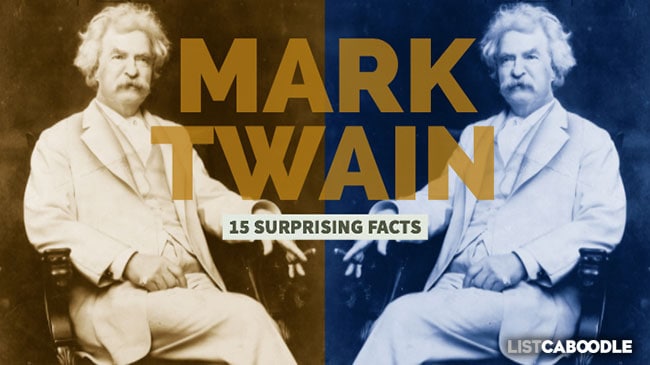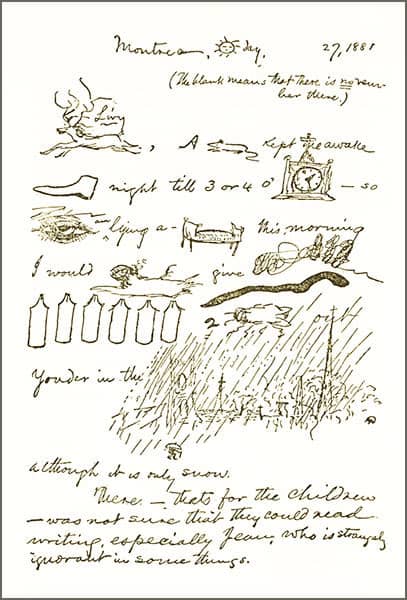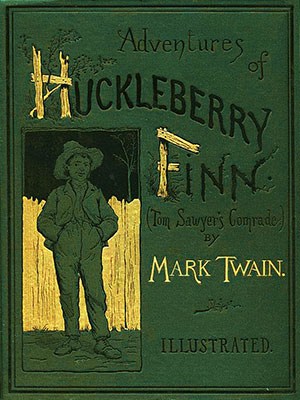15 Mark Twain Secrets And Surprising Facts
The creator of characters like Huckleberry Finn and Tom Sawyer was an interesting man himself.
Mark Twain was one of America’s first celebrities, known for his biting wit and irascible personality—not to mention his iconic white suit and ever-present cigar. Discover fifteen of the many Mark Twain secrets and surprising facts here!
Mark Twain secrets revealed
Author and humorist Mark Twain was born Samuel Langhorne Clemens in Florida, Missouri in 1835. Clemens took the pen name Mark Twain, a nod to his early years as a riverboat captain on the Mississippi River. The term “mark twain” represents two fathoms (12 feet deep) and safe passage for riverboats.
1. Samuel Clemens loved to use pen names, nicknames, and aliases:
Pen Names
Samuel Clemens enjoyed disguising his identity and using pen names, noms de plume and pseudonyms to publish his work:
- Mark Twain
- Rambler (Hannibal Daily Journal)
- Sergeant Fathom
- Thomas Jefferson Snodgrass
- Josh
- W. Epaminondas Adrastus Blab
- Phunny Phellow
- The Vandal
- Sieur Louis de Conte (Harper’s magazine)

Nicknames
Friends and family were known to give Clemens adoring nicknames and sobriquets:
- “The Moralist of the Main” by friend Charles Henry Webb
- “The Wild Humorist of the Pacific Slope” by friend Charles Henry Webb
- “Youth” by his wife Olivia
Aliases
Samuel Clemens sought anonymity by checking in at hotels with phony names:
- “C. L. Samuel”
- “S. L. Samuel”
Newspaper misprints
Mark Twain was also given some unintended names. Publishing errors in the 19th century were common:
- “Marque Twein” by the San Francisco Call
- “Mark Swain” by Harper’s New Monthly Magazine
- “Seth Twain” by the theatrical program Stage

Learn the pen name Charles Dickens used early in his career.
Mark Twain secrets you may not know
2. Mark Twain’s connection to Halley’s Comet
Mark Twain famously boasted that he came in with Halley’s Comet and he would go out with it. The comet, named after British scientist Edmund Halley, appears in the sky every 75 years. It made an appearance in 1835, the year Twain was born, and again the year Twain died, April 21, 1910.
3. He had a keen ear and a fondness for well-written words and phrases
Mark Twain admired the last words of Benjamin Franklin, “None but the brave deserve the fair.” Twain remarked of Franklin’s words, “He could not have said a sweeter thing if he had lived till he was an idiot.”
4. He had a fascination with twins
In an 1853 letter to his mother, a young Samuel Clemens reports seeing a pair of caged, dwarf twins in New York City. They were most likely the “Wild Men of Borneo,” a sideshow act of P. T. Barnum. The “curiosity” left an indelible mark on him and he used twins (and twinning) as a literary theme throughout his life.
For example, initial drafts of Pudd’nhead Wilson (preliminarily called Those Extraordinary Twins) included humorous predicaments involving differently-minded Siamese twins (one twin a drunkard and one a teetotaller, one pious and one not, etc.) and the inevitable tension and conflict between them. Twain had also seen the famous conjoined twins, Chang and Eng, and was fascinated by them.
5. He loved to doodle and sketch

Mark Twain would often doodle beside his words in notebooks and letters—for his own and other’s amusement. In a letter to his wife, he writes and doodles a rebus for her and their children to decipher (above). Note the clever representation of the date, “The blank means that there is no-vember there.”
You may also enjoy these wisecracks and witty quotes from Dorothy Parker.
Surprising Mark Twain secrets
6. He had a fierce temper
When tired or frustrated Twain was known to have a strong and unforgiving temper. He found life-long adversaries in negative book reviewers and questionable business transactions. Even after his perceived enemies’ deaths, he held a grudge and spoke ill of them as if the wound was still fresh.
7. He suffered life-long anxiety about money and was fixated on money-making schemes (including going into the cocaine business)
Mark Twain came from a poor upbringing and was always thinking about his next dollar. He summed up his cynical thoughts on money: “I have a religion—but you will call it blasphemy. It is that there is a God for the rich man but none for the poor.”
His early years in Keokuk, Iowa had him dreaming of far-off places like the Amazon valley in Brazil and scheming new ways to make money. Twain read about a vegetable product that, when ingested, gave the natives extraordinary strength and stamina to work all day without the need for any other sustenance. He envisioned bringing cocaine to America and “spring that splendid enterprise upon an unsuspecting planet.” But potential partners never materialized. He lacked the financial ability to go it alone at his young age.
Did You Know?
The first half of the original manuscript of Huckleberry Finn was discovered in 1990 in an old trunk in an attic. It had been presumed to be lost forever.
Odd Mark Twain secrets
8. He was enamored with earthquakes
By 1865, Mark Twain found himself in San Francisco writing for newspapers and enjoying his fame. That year, as many as a dozen quakes shook the city. Twain was exhilarated to the point of keeping an “Earthquake Almanac,” recording the dates of each geophysical event, commenting and taking notes. “This is the great earthquake month,” he wrote in November that year.
9. He was fascinated by dreams and believe they held deeper meanings
Twain captured his dreams in notebooks throughout his life (even before Sigmund Freud made it popular). He used some of the notes to write an article titled “My Platonic Sweetheart” for Harper’s Monthly Magazine about his recurring dream-romance with a girl named Helen. He believed dreams were a different form of reality. “In our dreams—I know it!—we do make the journeys we seem to make; we do see the things we seem to see,” he implored in his essay.
10. He wrote against the Senate candidacy of Abraham Lincoln
The Illinois senate race of 1858 pitted the incumbent Stephen Douglas against the challenger Abraham Lincoln and is best known as the most famous political debates in American history. The Lincoln-Douglas debates focused mainly on the topic of slavery in the United States. It is unclear whether Twain felt strongly about the slavery issue or not, but he nonetheless recommended voters favor Douglas over Lincoln. “Will (Illinois) voters do their duty, and sustain Mr. DOUGLAS? We trust they will,” he wrote in the Missouri Republican. Douglass was re-elected to the senate.
Twain’s brother Orion, on the other hand, would campaign fervently for Lincoln’s presidential bid two years later. As a reward for his hard work, Orion was granted a position in Carson City, Nevada as Secretary of the Territory. Always ready for a new adventure, Mark Twain packed up and joined his brother for his trip out west, bankrolling the trip with his riverboat pilot’s money.

11. He suffered from depression and suicidal thoughts
Twain had to work through periods of anxiety and depression throughout his life, mainly by distracting himself with his writing. During these dark periods, his mind was occupied with thoughts of “funerals and suicide.”
Twain once wrote about taking his own life, “I put the pistol to my head but wasn’t man enough to pull the trigger. Many times I have been sorry I did not succeed, but I was never ashamed of having tried.”
Unique Mark Twain secrets
12. He was critical of the old master painters’ works
On a visit through Europe, Twain encountered many of the masterpieces he had read about back home. He was underwhelmed by Leonardo da Vinci’s The Last Supper. His criticisms mainly focused on the deteriorating condition of the paintings. “Wherever you find a Raphael, a Rubens, a Michael Angelo, a Caracci, or a Da Vinci (and we see them every day,) you find artists copying them, and the copies are always the most handsome. Maybe the originals were handsome when they were new, but they are not now,” he said.
13. He was one of baseball’s first fans
Twain was a fan of his local team, the Harford Dark Blues, in the early days of professional baseball in the early 1870s.
14. He was an inventor
He was constantly dreaming of business and product ideas but lacked the business acumen to realize profits from them. Some of Twain’s business interests include:
- Mark Twain’s Self-Pasting Scrapbook – Twain’s invention of a book with pre-gummed pages for scrapbooking. It sold quite well.
- Adjustable and Detachable Garment Strap – The suspender-like product was well-intended but had no sales.
- Kaolatype – A process for producing illustration engravings for printing (made obsolete by the invention of halftone photoengraving).
- History trivia game – A “memory improver” board game for teaching historical dates and facts.
- Paige typesetting machine – The machine was never fully functional and became Twain’s biggest money loser in his lifetime, causing him to file for bankruptcy.
- Fire extinguisher – A glass hand grenade filled with fire-extinguishing fluid to be hurled into fires.
- Bed clamps – Clamps to hold bedsheets from slipping off children.
- Plasmon – A German health concoction derived from skim milk.
- Publishing – He published his own books as well as for others, including Ulysses S. Grant’s and Pope Leo XIII’s biographies.
Bizarre Mark Twain secrets
15. He wanted to replace the Statue of Liberty with a statue of Adam
One of the more bizarre Mark Twain secrets concerns the Statue of Liberty. Workers had barely started building its foundation in New York Harbor when Twain came up with an alternative plan, certain to ruffle the feathers of the cultural elite. Instead of Lady Liberty, he thought the statue should honor Adam. “What have we done for Adam? Nothing. What has Adam done for us? Everything,” he said. He proceeded to sketch out his idea. Oddly, he also had thoughts of including Christopher Columbus’ remains in the base of the Statue of Liberty.
“All say, “How hard it is that we have to die”—
a strange complaint to come from the mouths of people who have had to live.”
– Mark Twain from The Tragedy of Pudd’nhead Wilson
and the Comedy of the Extraordinary Twins
Mark Twain died on April 21, 1910. By his own words, he was a man of “sharp tongue & uncertain temper.” His lasting legacy is highlighted by his novels The Adventures of Tom Sawyer and the Adventures of Huckleberry Finn—sometimes called “The Great American Novel.”
By Greg Johnson | Published 6/8/2018
Encore
If you enjoyed reading about surprising Mark Twain’s secrets and facts, you may also enjoy the hidden secrets of Leonardo da Vinci.
History lovers will enjoy the 10 Ways Viking Warriors Changed the World.